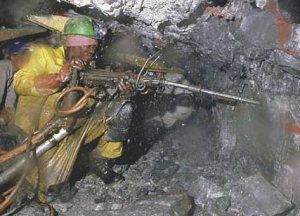
[miningmx.com] – THE mechanisation of the platinum industry has been the by-word for navigating the strike-ridden labour environment lately, and while that’s bad news for South Africa’s employment statistics, it’s a fillip for Master Drilling Group, a mining services company that debuted on the JSE in December 2012.
“That [mechanisation] sits 100% with what we do,’ says Andre van Deventer, CFO of Master Drilling which in March posted a 28.4% increase in headline share earnings to 99.2 cents (10.3 US cents) for its 2013 financial year.
Mechanisation of future platinum mines means more capital outlay for the likes of Impala Platinum and Anglo American Platinum, but less labour and lower unit operating costs. It’s being talked about owing to the stiff wage demands being asked by the Association of Mineworkers & Construction Union (AMCU), and the strike in the sector – now nearly 12 weeks old at the time of writing.
Master Drilling provides drilling services for operating mines using its specialised raise boring techniques which, for the edification of non-mining readers, is a quick and easy way of drilling vertical holes in the ground in operating mines. The drill is pulled upwards through the earth. It also conducts conventional drilling for exploration companies.
The share has been going great guns registering a 50% 12-month return, and 20% in the last fortnight. The Yin and Yang of Master Drilling’s shares, however, is that it’s tightly held with about two-thirds in management’s possession. That’s good because owner-operators are motivated to make profits, but bad because the share is quite illiquid.
Investec Asset Management and Afina Capital Management, two Cape-based asset managers, are holders in Master Drilling, but the man-in-the-street may struggle to pick up shares.
Van Deventer acknowledges the problem: “It’s a chicken-egg thing. We don’t think the share is properly valued [hence reticence to release shares to the market], but the market tends not to recognise the share when it is so illiquid,’ he says.
For now, the attraction of Master Drilling is that it’s a capital growth company. The dividend was passed for the last financial year and will most likely not be paid after the current financial year either. That’s because the company is spending – some R350m in the 2013 financial year – as it said it would in its pre-listing statement in order to expand its order book.
What’s interesting about Master Drilling is the geographical diversity. The majority of its revenue is derived from Latin America where it is heavily involved in drilling services for copper miners, an activity that yields a revenue to gross profit margin of about 38%. The next largest segment of revenue is derived from South Africa but at a lower margin of about 23%.
Van Deventer says strikes in South Africa is affecting the business somewhat, but ground conditions in Latin America are actually softer such that Master Drilling’s fleet can advance at 100 metres a month in, say, Chile whereas at 40m a month in South Africa, the going is much harder.
The plan is to build out the group’s geographical diversity further, and possibly look at acquisitions. Europe is an area of interest to Master Drilling; so is Africa, naturally, says Van Deventer.
“Although we have mentioned an interest in acqusitions, there also needs to be a fit with our culture. So we’re really picky in terms of acquisitions. The pressures on our results is not that high at the moment, so that gives us more time,’ he says.
It will be interesting to see where Master Drilling does find a similar business with which to merge or buy.
The company operates in the sticks near Fochville, and along the partially tumbledown road that leads to Potchefstroom. It also operates like a family business where the pennies are carefully watched.











